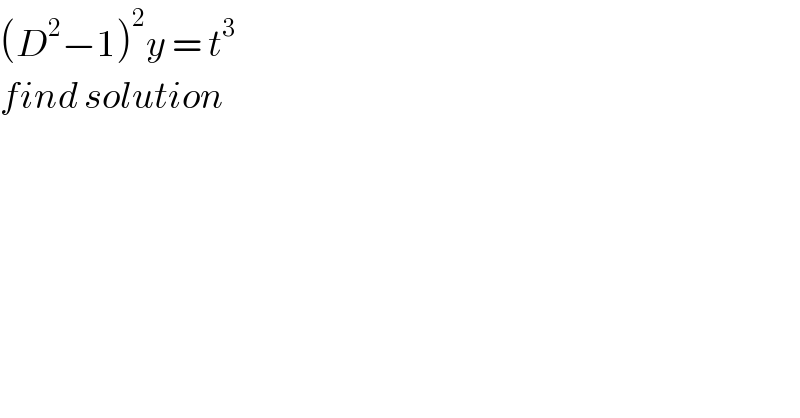
Question Number 82390 by jagoll last updated on 21/Feb/20

$$\left({D}^{\mathrm{2}} −\mathrm{1}\right)^{\mathrm{2}} {y}\:=\:{t}^{\mathrm{3}} \\ $$$${find}\:{solution} \\ $$
Answered by TANMAY PANACEA last updated on 21/Feb/20
![y=e^(mt) so (dy/dt)=me^(mt) and (d^2 y/dt^2 )=m^2 e^(mt) (m^2 −1)^2 =0 m=1,1,−1,−1 complementary function y=Ae^t +Bte^t +Ce^(−t) +Fte^(−t) particular intregal now formula (1+x)^(−2) =1−2x+3x^2 −4x^3 +... y=(t^3 /((D^2 −1)^2 ))=(t^3 /((1−D^2 )^2 )) y=(1−D^2 )^(−2) t^3 =(1+2D^2 +3D^4 +others terms ignored)t^3 =(t^3 +2×3×2t) [(dt^3 /dt)=3t^2 →((d(3t^2 ))/dt)=6t] =t^3 +12t complete solution y=Ae^t +Bte^t +Ce^(−t) +Fte^(−t) +t^3 +12t](Q82394.png)
$${y}={e}^{{mt}} \:\:{so}\:\:\:\:\:\frac{{dy}}{{dt}}={me}^{{mt}} \:{and}\:\:\:\frac{{d}^{\mathrm{2}} {y}}{{dt}^{\mathrm{2}} }={m}^{\mathrm{2}} {e}^{{mt}} \\ $$$$\left({m}^{\mathrm{2}} −\mathrm{1}\right)^{\mathrm{2}} =\mathrm{0} \\ $$$${m}=\mathrm{1},\mathrm{1},−\mathrm{1},−\mathrm{1} \\ $$$${complementary}\:{function} \\ $$$${y}={Ae}^{{t}} +{Bte}^{{t}} +{Ce}^{−{t}} +{Fte}^{−{t}} \\ $$$$ \\ $$$${particular}\:{intregal} \\ $$$${now}\:{formula} \\ $$$$\left(\mathrm{1}+{x}\right)^{−\mathrm{2}} =\mathrm{1}−\mathrm{2}{x}+\mathrm{3}{x}^{\mathrm{2}} −\mathrm{4}{x}^{\mathrm{3}} +... \\ $$$${y}=\frac{{t}^{\mathrm{3}} }{\left({D}^{\mathrm{2}} −\mathrm{1}\right)^{\mathrm{2}} }=\frac{{t}^{\mathrm{3}} }{\left(\mathrm{1}−{D}^{\mathrm{2}} \right)^{\mathrm{2}} } \\ $$$${y}=\left(\mathrm{1}−{D}^{\mathrm{2}} \right)^{−\mathrm{2}} {t}^{\mathrm{3}} \\ $$$$=\left(\mathrm{1}+\mathrm{2}{D}^{\mathrm{2}} +\mathrm{3}{D}^{\mathrm{4}} +{others}\:{terms}\:{ignored}\right){t}^{\mathrm{3}} \\ $$$$=\left({t}^{\mathrm{3}} +\mathrm{2}×\mathrm{3}×\mathrm{2}{t}\right)\:\:\:\left[\frac{{dt}^{\mathrm{3}} }{{dt}}=\mathrm{3}{t}^{\mathrm{2}} \rightarrow\frac{{d}\left(\mathrm{3}{t}^{\mathrm{2}} \right)}{{dt}}=\mathrm{6}{t}\right] \\ $$$$={t}^{\mathrm{3}} +\mathrm{12}{t} \\ $$$${complete}\:{solution} \\ $$$${y}={Ae}^{{t}} +{Bte}^{{t}} +{Ce}^{−{t}} +{Fte}^{−{t}} +{t}^{\mathrm{3}} +\mathrm{12}{t} \\ $$
Commented by jagoll last updated on 21/Feb/20

$${thank}\:{you}\:{sir} \\ $$
Commented by TANMAY PANACEA last updated on 21/Feb/20

$${most}\:{welcome} \\ $$
